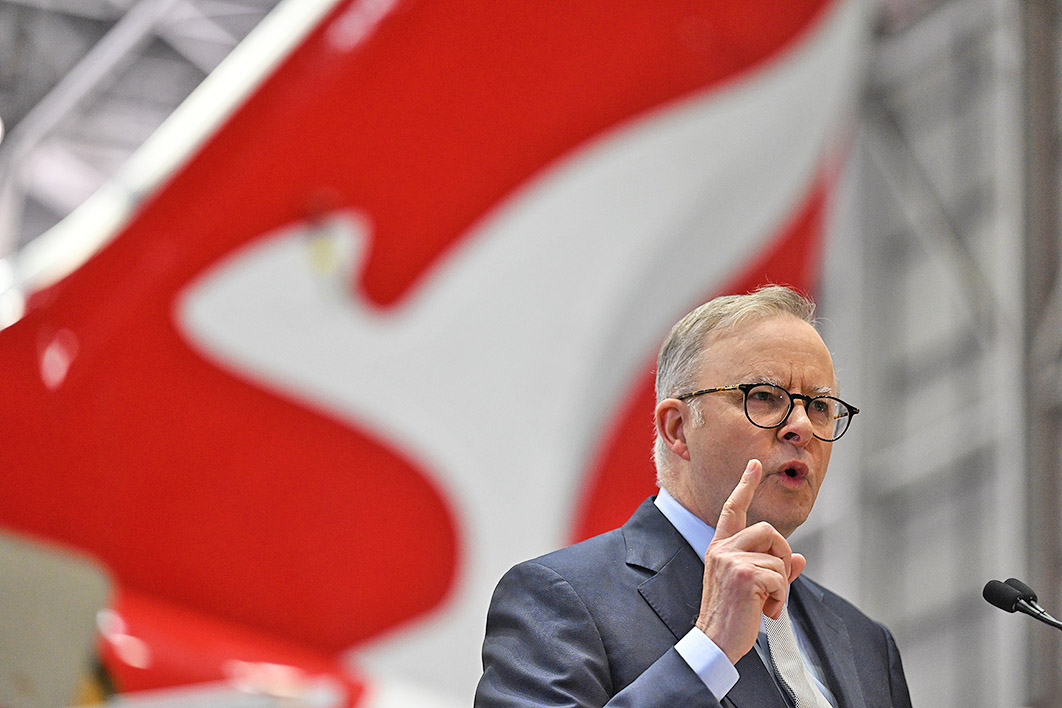International observers weren’t greatly puzzled by the federal government’s decision to block Qatar Airways’ bid to boost its access to Australian skies. After all, protectionism is so common in international aviation that it has become almost unremarkable.
What did catch their attention was the government’s cagey response when it was questioned about the decision. The 2020 stripsearch of Australian passengers in Doha cracked a mention, and there was vague talk about decarbonisation targets.
When transport minister Catherine King did finally admit that the decision had all been about defending national markets, the next question was obvious: why the initial obfuscation?
One explanation is that the government was alert to political sensitivities. The obvious beneficiary of its decision to block Qatar is Qantas, an airline that no longer attracts the national affection it once did. Revealing the real reason for the decision would have raised the question of how Qantas manages to get its way so often, despite growing resentment in the electorate. And pretty soon the talk would have turned to lobbying.
Coincidentally, Qantas’s Chairman’s Lounge — the airline’s network of free luxury lounges for handpicked chief executives, judges, politicians and senior bureaucrats — has been the subject of critical comment in the Australian Financial Review this month. The paper reported that Nathan Albanese, the prime minister’s twenty-three-year-old son, was among those entitled to enjoy the Lounge’s benefits, which include food, drink and business facilities in pleasant, secluded locations at most Australian capital city airports.
Singling out one Lounge member might have been unfair, but it did raise an important question: should politicians be accepting a gift of such value from a government-regulated company? Blocking Qatar’s expansion into Australia harms both consumers and Qantas’s domestic rival Virgin Australia, which has been denied the additional passengers Qatar Airways would have fed into its routes. All of the cabinet members who made that decision have been offered — and we know have accepted — membership of an exclusive club.
The fact that key politicians list their Chairman’s Lounge membership in parliament’s register of members’ interests — usually alongside their free Foxtel subscription — doesn’t make it right. Lawmakers (and their spouses and other family members) are receiving the equivalent of thousands of dollars from an Australian company that benefits directly from their decisions. The register’s limited transparency doesn’t change that.
And it’s not just about Qantas. Among the gifts declared by federal parliamentarians are memberships of their local RSL or racing clubs and tickets to concerts and high-profile sports events. The quid pro quo may not be clear, but it’s there — if not, who would bother? It may be that businesses are out to buy access, or simply to promote an event by luring well-known faces into the audience. Either way, they want something.
Whatever the motivation, the quo being bought by the sponsor’s quid isn’t the politicians’ to give. Their reputations, their influence and any executive power they wield is res publica — a public thing. It belongs to the Australian state and, by implication, to the Australian people.
But there’s a second reason why membership of the Qantas Chairman’s Lounge is a concern: it comes against a backdrop of a transparency regime that is miles behind those of other Western democracies.
While the European Union’s transparency arrangements aren’t perfect, at least journalists and other outsiders can broadly sketch out what lobbyists are up to. For example, we know that EU competition commissioner Margrethe Vestager met with Amazon on 21 June to discuss artificial intelligence, and that Meta had discussed digital-platform regulation with her a couple of days earlier. It’s all logged and readily accessible; and only registered lobbyists are allowed to book a meeting.
Ireland’s mandatory lobbying register goes even further. Any contact between politicians or public servants and company lobbyists has to be reported — by the company. Even a chance meeting in the aisles of a supermarket needs to be logged. A few clicks of your mouse will reveal the dates meetings occurred, who was there, and what was discussed.
Here in Australia we only know that Qatar Airways enlisted Australian lobbying firm GRACosway on 27 July because the airline, owned by the Qatari state, has to report its movements to Australia’s foreign influence register. Yet Qatar Airways doesn’t appear among GRACosway’s clients on the separate lobbyist register.
There’s simply no way to find out what contact there has been between lobbyists and government officials; meetings aren’t made public and it’s impossible to know what was discussed. The names of the lobbyists engaging on specific issues aren’t disclosed.
The lobbyist register does tell us that Qantas uses SEC Newgate, a firm with registered lobbyists that include an adviser who worked in Albanese’s office between May 2022 and March 2023. But we don’t know what meetings were held between the firm and government decision-makers in the lead-up to the Qatar Airways decision, or who attended those meetings.
This Wild West of lobbying means that an invitation-only club that counts most federal politicians as member becomes an opportunity for access — access that’s ultimately controlled by the chairman of Qantas, who issues the invitations. Any lobbyist or company executive lucky enough to have a membership in his or her pocket can easily find a way to bump into decision-makers while the warm face washers are being handed out or have a chat while queuing up for the hors d’oeuvres.
Managing this kind of access to our elected representatives is a remarkable amount of power for the Australian state to hand over to a business — a business that stands to gain from policy settings put in place by the lawmakers who accept its hospitality. The government’s decision to stymie Qatar Airways’ Australian expansion may well have been justified, but it has been tarnished by an institutional lack of transparency and the conflicts of interest underpinning Australia’s political classes. •




